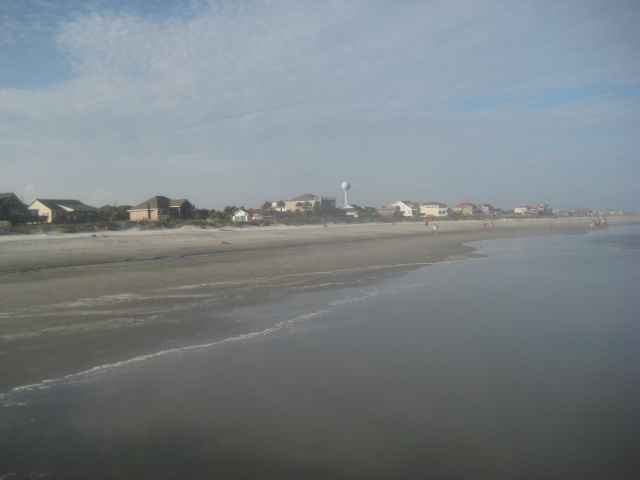Pollution shuts down beaches in record numbers
For millions of Americans this past week, one of the few options to keep from baking in the heat wave was the promise of a sandy beach with cool waters to frolic in.
But that hope could lead to a carload of crestfallen when getting to the beach and seeing the dreaded red sign, warning swimmers to stay out of the water because it was polluted. It’s happening more than ever these days and surprisingly it’s more prevalent for Great Lakes beaches than those sandy stretches on the costs.
The main culprits continue to be storm water runoff and sewage pollution, notes the National Resources Defense Council. Last year, beaches were closed or advisories were issued about bad water 8 percent of the time, the third highest ever. The second-most was in 2010. The group found that storm water runoff was the cause in 47 percent of the closings.
About 3.5 million people a year get sick from swimming in polluted beach water.
The worst beaches were found in Ohio and Louisiana, where they were closed 22 percent and 29 percent of the time. In Louisiana’s case, the NRDC found that the BP Gulf of Mexico oil spill is still affecting Gulf beaches two years after the an oil rig exploded and leaked 4.9 million barrels of oil before the leak could be capped.
All Great Lakes states ranked in the bottom 13 for water quality. They saw closings 11 percent of the time, while western state beaches were affected 8 percent, New England, 7 percent, New York-New Jersey region, 6 percent, the Gulf Coast, 6 percent, the Delmarva region, 4 percent and the southeast, 3 percent.
The cleanest beaches were found in Delaware and New Hampshire, where closings happened 1 percent of the time. New Jersey, Florida and North Carolina followed, with beaches closed about 3 percent during the season.
The worst beaches were found at Avalon Beach in Los Angeles and Doheny State Beach in Orange County. Among the best were found at Gulf Shores Beach in Alabama, Newport Beach in California and Ocean City in Maryland. Those beaches were packed this week as powerless residents sought old-fashioned ways to escape round-the-clock sweating.
Duluth’s Park Point beaches had the cleanest overall water among Great Lakes states.
In Milwaukee, South Shore Beach was closed 25 percent of the time over the past four years, putting it in the top 15 of the worst beaches in the country. This season the beach has had elevated bacteria counts on 23 of 30 days of testing.
This particular beach sits behind a break wall and in a slack water area, making it hard for the water to turn itself over and get fresh in to the area. Milwaukee County officials admit the situation could be futile and are looking into moving the beach down the coast a few hundred yards.
Two other Milwaukee beaches are also battle grounds featuring sewage, gull poop and other bacteria.
Overall, Wisconsin beaches on Lakes Michigan and Superior were closed 11 percent of the time, putting it 25th in terms of beach water quality. Illinois and Indiana ranked lower with 11 percent and 12 percent closures.
The NRDC calls for more efforts to be made to control runoff. Green infrastructure would go a long way to help, it says. The Environmental Protections Agency is setting new standards for beach water quality that the group says is too lenient.
Pipeline Spill Fine Issued: A record fine has been set for the Enbridge Inc. oil pipeline spill in 2010. The U.S. Department of Transportation’s Pipeline and Hazardous Materials Safety Administration has handed down a $3.7 million fine for numerous Enbridge violations that resulted in a spill of more than 1 million gallons of oil into the Kalamazoo River in southwestern Michigan.
The agency found 24 violations including failing to fix corrosion problems in the damaged pipe that dated back to 2004. After two years the cleanup is nearly complete, however some sections of the river remain closed to the public. It has 30 days to appeal the fine. The National Transportation Safety Board is expected to issue its findings on what caused the pipe to receive a six-and-a-half foot gash that spewed oil for 18 hours.
While the fine may be a record, it’s still being viewed outside oil circles as a slap on the wrist for a company that declared net income of $677 million in 2011.
Enbridge is asking the state of Michigan to give it permission to increase the flow of oil through the faulty line. Enbridge pipelines stretch to Alberta, where tar sand oil begins its journey south to the states.
The Power of Democracy: The state of North Carolina is now in the fracking business after a state lawmaker accidentally voted the wrong way.
Charlotte Democrat Becky Carney voted for fracking in one of the most controversial pieces of legislation this year. Problem was she is opposed to fracking. She was the deciding vote to approve natural gas drilling in the state. The vote was to override a veto by Gov. Bev Perdue.
After realizing her mistake, Carney tried to change her vote but the Republican House leader refused to let her. “I made a huge mistake,” Carney said.

Doug Hissom writes a weekly environmental column for Baltimore Post-Examiner. He has covered local and state politics in Wisconsin for more than 20 years. Over the course of that time he was publisher, editor, news editor, managing editor and senior writer at the Shepherd Express weekly paper in Milwaukee. He also covered education and environmental issues extensively. He ran the UWM Post in the mid-1980s, winning a Society of Professional Journalists award as best non-daily college newspaper. An avid outdoors person he regularly takes extended paddling trips in the wilderness, preferring the hinterlands of northern Canada and Alaska. After a bet with a bunch of sailors, he paddled across Lake Michigan in a canoe.

